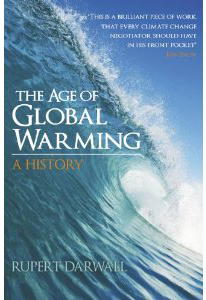Book Release: The Age of Global Warming ~ By Rupert Darwall
The Age of Global Warming by Rupert Darwall offers a critical perspective on the development of climate change policies, analyzing the historical and political factors that have shaped the current environmental discourse. The green energy mirage will cost the Earth
 In 1988, the year global warming entered politics, Margaret Thatcher declared that mankind had unwittingly been carrying out a massive experiment with the planet. Burning fossil fuels would produce greenhouse gases, leading to higher global temperatures. The results of this experiment remain an open question. As Rajendra Pachauri, head of the Intergovernmental Panel on Climate Change, acknowledged last month, there has been a 17-year pause in the rise of average global temperatures.
In 1988, the year global warming entered politics, Margaret Thatcher declared that mankind had unwittingly been carrying out a massive experiment with the planet. Burning fossil fuels would produce greenhouse gases, leading to higher global temperatures. The results of this experiment remain an open question. As Rajendra Pachauri, head of the Intergovernmental Panel on Climate Change, acknowledged last month, there has been a 17-year pause in the rise of average global temperatures.
More immediate consequences to British families are that the UK has embarked on perhaps the most aggressive political experiment attempted in peacetime – gradually outlawing fossil fuels, which we have relied on since the Industrial Revolution, as our principal energy source. The results are already evident. Two weeks ago, Alistair Buchanan, chief executive of Ofgem, warned of rising energy bills and questioned whether Britain could keep the lights on. When a glut of natural gas in the US and coal prices are plunging in Europe, this country faces a green energy crunch as it attempts to decarbonise its economy.
Environmentalism has taken the Marxist concept of the alienation of the working class and applied it to the rich man’s alienation from nature. “By losing sight of our relationship with Nature…,” the Prince of Wales wrote in 2009, “we have engendered a profoundly dangerous alienation.” In one respect, environmentalism is even more radical than Marxism. Whereas Marxism aimed to change the relations of the working class to the means of production, environmentalism is about changing the means of production themselves. Ironically, Marxism was a flop in the West, whereas environmentalism has triumphed.
Britain has gone so far down the green path because politicians have not been honest about its economic implications. During the passage of the Climate Change Act in 2008, which commits Britain to cutting net carbon emissions by at least 80 percent by 2050, the energy minister Phil Woolas rejected his own department’s estimate that the costs could exceed the benefits by £95 billion. The House of Commons never debated the costs, and the Bill was passed, with only five MPs voting against.
Ed Miliband, the climate change secretary, provides an even more egregious example. The Tory MP Peter Lilley had written to Mr Miliband to say that, based on his department’s impact statement, the Climate Change Act would cost households between £16,000 and £20,000. The future Labour leader replied that the statement showed that the benefits to British society of successful action on climate change would be far higher than the cost. Mr Miliband should have known this was untrue; if he didn’t, he had no business certifying that he’d read the impact statement, which he’d signed just six weeks earlier. The statement only estimated the benefits of slightly cooler temperatures for the world, not the UK.
Indeed, in April 2012, the current Energy and Climate Change Secretary, Ed Davey, confirmed that his department was unaware of evidence allowing Ed Miliband to claim that the UK would be better off with green policies. However, the impact statement said that imposing green policies unilaterally without an international agreement would “result in a large net cost for the UK”.
Here, environmentalism came up against an immovable object, which explains why there is no effective international agreement—and there is unlikely ever to be one. Led by India and China, the major developing economies—now responsible for most of the extra emissions—simply refuse to agree to any international treaty that might require them to limit their carbon footprint.
Western politicians spun the mirage of “green growth”, of environmentalism without tears. Green growth was for gullible voters back home. It wasn’t mentioned behind closed doors at the 2009 Copenhagen climate conference, when the West implored developing countries to sign on the dotted line. It should not have surprised anyone that the developing world did not. Ever since 1972 and the first UN conference on the environment in Stockholm, the involvement of the developing world has been subject to a strict condition – international action on the environment must not fetter their economic development. Subsequently, Canada – a climate change pioneer – announced its withdrawal from Kyoto.
The year before the Copenhagen conference, Oliver Letwin, David Cameron’s chief policy adviser, bet the former chancellor Lord Lawson £100 that there would be agreement on a successor to the Kyoto Protocol by 2012. On winning the bet, Lord Lawson remarked that Mr Letwin, one of the nicest people in politics, was divorced from any understanding of practical realities.
Without an international agreement, it is pointless for the UK to spend hundreds of billions of pounds on green energy, reduce its growth, and cut living standards. The green energy crunch promises to cost us much more than Oliver Letwin’s losing bet.
About Rubert Darwall
Rupert Darwall read economics and history at Cambridge, after which he worked at the Conservative Research Department, then in the City as an investment analyst and in corporate finance. He has written for leading UK and US-based think tank publications.
GET YOUR OFFICIAL BOOK ~ “THE AGE OF GLOBAL WARMING” BY RUPERT DARWALL BY CLICKING HERE »> GO!
You can return to the main Books & Films page, or press the Back button on your browser.

